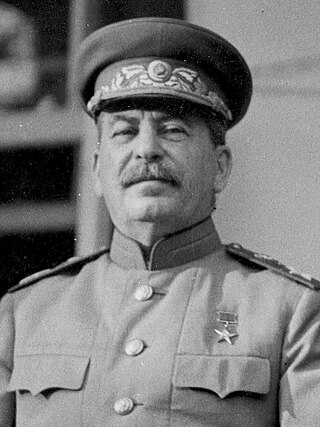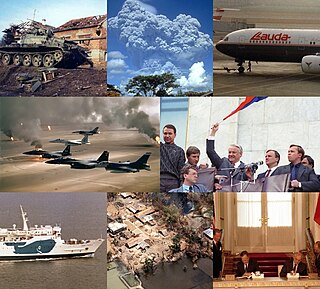Related Research Articles

Joseph Vissarionovich Stalin was a Soviet politician and revolutionary who led the Soviet Union from 1924 until his death in 1953. He held power as General Secretary of the Communist Party from 1922 to 1952 and as Chairman of the Council of Ministers from 1941 until his death. Initially governing as part of a collective leadership, Stalin consolidated power to become a dictator by the 1930s. He codified his Leninist interpretation of Marxism as Marxism–Leninism, while the totalitarian political system he established became known as Stalinism.

Jefferson F. Davis was an American politician who served as the first and only president of the Confederate States from 1861 to 1865. He represented Mississippi in the United States Senate and the House of Representatives as a member of the Democratic Party before the American Civil War. He was the United States Secretary of War from 1853 to 1857.

Jeffrey Lionel Dahmer, also known as the Milwaukee Cannibal or the Milwaukee Monster, was an American serial killer and sex offender who killed and dismembered seventeen men and boys between 1978 and 1991. Many of his later murders involved necrophilia, cannibalism, and the permanent preservation of body parts—typically all or part of the skeleton.

Malcolm X was an African American revolutionary, Muslim minister and human rights activist who was a prominent figure during the civil rights movement until his assassination in 1965. A spokesman for the Nation of Islam (NOI) until 1964, he was a vocal advocate for Black empowerment and the promotion of Islam within the African American community. A controversial figure accused of preaching violence, Malcolm X is also a widely celebrated figure within African American and Muslim communities for his pursuit of racial justice.

The Silence of the Lambs is a 1991 American psychological horror thriller film directed by Jonathan Demme and written by Ted Tally, adapted from Thomas Harris's 1988 novel. It stars Jodie Foster as Clarice Starling, a young FBI trainee who is hunting a serial killer named "Buffalo Bill", who skins his female victims. To catch him, she seeks the advice of the imprisoned Hannibal Lecter, a brilliant psychiatrist and cannibalistic serial killer. The film also features performances from Scott Glenn, Anthony Heald, and Kasi Lemmons.

Sir Winston Leonard Spencer Churchill was a British statesman, military officer, and writer who was Prime Minister of the United Kingdom from 1940 to 1945 and again from 1951 to 1955. Apart from 1922 to 1924, he was a member of Parliament (MP) from 1900 to 1964 and represented a total of five constituencies. Ideologically an adherent to economic liberalism and imperialism, he was for most of his career a member of the Conservative Party, which he led from 1940 to 1955. He was a member of the Liberal Party from 1904 to 1924.

1991 (MCMXCI) was a common year starting on Tuesday of the Gregorian calendar, the 1991st year of the Common Era (CE) and Anno Domini (AD) designations, the 991st year of the 2nd millennium, the 91st year of the 20th century, and the 2nd year of the 1990s decade.

Katharine Houghton Hepburn was an American actress whose career as a Hollywood leading lady spanned six decades. She was known for her headstrong independence, spirited personality, and outspokenness, cultivating a screen persona that matched this public image, and regularly playing strong-willed, sophisticated women. She worked in a varied range of genres, from screwball comedy to literary drama, which earned her various accolades, including four Academy Awards for Best Actress—a record for any performer.

Paul-Michel Foucault was a French historian of ideas and philosopher who was also an author, literary critic, political activist, and teacher. Foucault's theories primarily addressed the relationships between power versus knowledge and liberty, and he analyzed how they are used as a form of social control through multiple institutions. Though often cited as a structuralist and postmodernist, Foucault rejected these labels and sought to critique authority without limits on himself. His thought has influenced academics within a large number of contrasting areas of study, with this especially including those working in anthropology, communication studies, criminology, cultural studies, feminism, literary theory, psychology, and sociology. His efforts against homophobia and racial prejudice as well as against other ideological doctrines have also shaped research into critical theory and Marxism–Leninism alongside other topics.

Srinivasa Ramanujan Aiyangar (22 December 1887 – 26 April 1920) was an Indian mathematician. Often regarded as one of the greatest mathematicians of all time, though he had almost no formal training in pure mathematics, he made substantial contributions to mathematical analysis, number theory, infinite series, and continued fractions, including solutions to mathematical problems then considered unsolvable.

Empress Matilda, also known as Empress Maud, was one of the claimants to the English throne during the civil war known as the Anarchy. The daughter and heir of Henry I, king of England and ruler of Normandy, she went to Germany as a child when she was married to the future Holy Roman Emperor Henry V. She travelled with the emperor to Italy in 1116, was controversially crowned empress in St Peter's Basilica, and acted as the imperial regent in Italy. Matilda and Henry V had no children, and when he died in 1125, the imperial crown was claimed by his rival Lothair of Supplinburg.

Marvin Pentz Gaye Jr. was an American singer-songwriter and musician. He helped shape the sound of Motown in the 1960s, first as an in-house session player and later as a solo artist with a string of successes, which earned him the nicknames "Prince of Motown" and "Prince of Soul".

The Gulf War was an armed conflict between Iraq and a 42-country coalition led by the United States. The coalition's efforts against Iraq were carried out in two key phases: Operation Desert Shield, which marked the military buildup from August 1990 to January 1991; and Operation Desert Storm, which began with the aerial bombing campaign against Iraq on 17 January 1991 and came to a close with the American-led liberation of Kuwait on 28 February 1991.

Vlad III, commonly known as Vlad the Impaler or Vlad Dracula, was Voivode of Wallachia three times between 1448 and his death in 1476/77. He is often considered one of the most important rulers in Wallachian history and a national hero of Romania.

Pink Floyd are an English rock band formed in London in 1965. Gaining an early following as one of the first British psychedelic groups, they were distinguished by their extended compositions, sonic experiments, philosophical lyrics, and elaborate live shows. They became a leading band of the progressive rock genre, cited by some as the greatest progressive rock band of all time.

Genghis Khan, also known as Chinggis Khan, was the founder and first khan of the Mongol Empire. After spending most of his life uniting the Mongol tribes, he launched a series of military campaigns, conquering large parts of China and Central Asia.

Ganesha, also spelled Ganesh, and also known as Ganapati, Vinayaka, Lambodara and Pillaiyar, is one of the best-known and most worshipped deities in the Hindu pantheon and is the Supreme God in the Ganapatya sect. His depictions are found throughout India. Hindu denominations worship him regardless of affiliations. Devotion to Ganesha is widely diffused and extends to Jains and Buddhists and beyond India.

The Russian Soviet Federative Socialist Republic, previously known as the Russian Soviet Republic and the Russian Socialist Federative Soviet Republic, and unofficially as Soviet Russia, was an independent federal socialist state from 1917 to 1922, and afterwards the largest and most populous constituent republic of the Soviet Union (USSR) from 1922 to 1991, until becoming a sovereign part of the Soviet Union with priority of Russian laws over Union-level legislation in 1990 and 1991, the last two years of the existence of the USSR. The Russian SFSR was composed of sixteen smaller constituent units of autonomous republics, five autonomous oblasts, ten autonomous okrugs, six krais and forty oblasts. Russians formed the largest ethnic group. The capital of the Russian SFSR and the USSR as a whole was Moscow and the other major urban centers included Leningrad, Stalingrad, Novosibirsk, Sverdlovsk, Gorky and Kuybyshev. It was the first socialist state in history.

Terminator 2: Judgment Day is a 1991 American science fiction action film directed by James Cameron, who co-wrote the script with William Wisher. Starring Arnold Schwarzenegger, Linda Hamilton, and Robert Patrick, it is the sequel to The Terminator (1984) and is the second installment in the Terminator franchise. In the film, the malevolent artificial intelligence Skynet sends a Terminator—a highly advanced killing machine—back in time to 1995 to kill the future leader of the human resistance John Connor when he is a child. The resistance sends back a less advanced, reprogrammed Terminator to protect Connor and ensure the future of humanity.

The Union of Soviet Socialist Republics (USSR) was formally dissolved as a sovereign state and subject of international law on 26 December 1991 by Declaration № 142-Н of the Soviet of the Republics of the Supreme Soviet of the Soviet Union. It also brought an end to the Soviet Union's federal government and General Secretary Mikhail Gorbachev's effort to reform the Soviet political and economic system in an attempt to stop a period of political stalemate and economic backslide. The Soviet Union had experienced internal stagnation and ethnic separatism. Although highly centralized until its final years, the country was made up of 15 top-level republics that served as the homelands for different ethnicities. By late 1991, amid a catastrophic political crisis, with several republics already departing the Union and Gorbachev continuing the waning of centralized power, the leaders of three of its founding members, the Russian, Belorussian, and Ukrainian SSRs, declared that the Soviet Union no longer existed. Eight more republics joined their declaration shortly thereafter. Gorbachev resigned on 25 December 1991 and what was left of the Soviet parliament voted to dissolve the union.